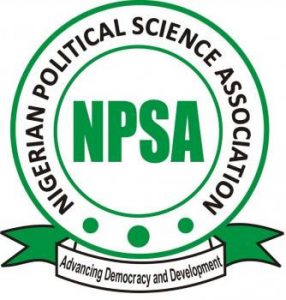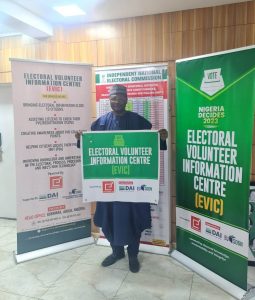On-going electoral experience in Nigeria makes some of the recommendations here crucial inputs and the communique publishable in its entirety. Or so does Intervention think, even if only for the records.
(A) Preamble
The NPSA, with support from the MacArthur Foundation, held a two-day meeting which focused on the 2023 elections in Nigeria. The meeting was held at Rosebud Hotel, Abuja from Friday to Saturday, May 19-20, 2023. It was a hybrid meeting with physical and online participation via zoom and had in attendance 25 physical and many virtual participants drawn from academia, civil society, National Assembly that included Professors Adele Jinadu, Chairman of IPAC, Alhaji Yagbagi Y. Sani, the African Director of MacArthur Foundation, Dr. Kole Shettima, representatives of CISLAC, some members of the National Executive Committee of NPSA, among others. The meeting was chaired by Professor Adele Jinadu.
The two-day meeting critically reviewed the 2023 General Elections. Participants observed that aspects of the elections witnessed tremendous improvements particularly the deployment of ICT in the elections. They also noted critical areas that are in need of improvement as well as the pathways to sustainable democratic elections. The participants observed that the areas needing further reforms are the Electoral System; Political Parties and Party System; Citizenship Engagement with the electoral process; and INEC and the Management of the electoral process.

Organisers of the Series
(B). Observations:
Specifically, the participants observed as follows:
(1). The legislative constituencies in Nigeria are single-member constituencies based on the Simple Plurality or First-Past-the-Post (FPTP) System. For example, in the Presidential and Governorship Elections, contestants are elected first on simple plurality of votes and a requirement of spread of votes received. Thus, for the President, the winner must score the highest votes cast and 25% of votes cast in two-thirds of the States of the Federation and the FCT;
(2). Participants noted that the FPTP system creates inequities in the system. The proportion of votes scored by a party generally hardly coheres with the number of legislative seats it has;
(3). The winner-takes-all that is associated with FPTP has also been responsible for the cut-throat competition among the politicians. This is why the NPSA is calling for a reform of that system to introduce proportionality, based on Proportional Representation at the level of the legislature. The participants were in agreement with the Uwais Committee Report which recognized these inherent inequalities and recommended a mixed model in which 30% of each legislative assembly is added and filled by proportional representation;
(4). Citizens’ poor understanding and knowledge of the electoral process, electoral environment, and citizens’ responsibilities and rights concerning the electoral process have resulted in marginal inputs of citizens and civil society in the electoral process. For example, beyond the many workshops and training on civic responsibilities, voter registration and voting and mandate protection, which have dominated civil society engagements since 1999, citizens’ cynicism, apathy, distrust and disrespect for law and order, and the rights of others remain the dominant forms and modes of engagement with the electoral process;
(5). Poor political socialisation and non-inculcation in citizens of their obligations and responsibilities to the state and inadequate knowledge and understanding of the concepts of citizenship, governance, and electoral democracy are impediments to full participation in the democratic process;
(6). Nigeria’s political parties through their conduct have brought the judiciary more into the arena of politics for adjudication;
(7). Citizens are influenced by money politics, intolerance for diversity, and political violence because of dispositions and orientations rooted in corruption, indiscipline, disrespect for law and order and intolerance for diversity;
(8). Bad attitude of politicians and political parties towards the electioneering process has negative impact on the electoral process;
(9). Manipulation of party primaries as a result of lack of internal democracy in the political parties and marginalization of interests of minority groups within the parties also affect the electoral process;
(10). Campaigns by political parties have always been based on religion and ethnicity instead of their respective manifestos which have resulted in failure to perform their main roles of interest articulation, leadership recruitment and providing civic education;
(11). Lack of consensus among Nigerian political parties regarding the necessary reforms to be carried out on the preferred electoral system;
(12). Partisan interests are placed above national interest;
(13). Poor party funding has enabled wealthy individuals to dominate and control the political parties;
(14). Limited engagement of the grassroots negatively affects the electoral process;
(15). Weak enforcement mechanisms for party constitution weakens the party system;
(16). The problem of party defections is encouraged by the party system;
(17). INEC has not been able to adequately monitor the finances of political parties or manage their activities;
(18). Politicization of appointments and recruitments of key staff of INEC such as National Commissioners, Resident Electoral Commissioners, Ad-hoc staff also negatively affect the electoral process;
(19). The problem of lack of appropriate qualifications guiding the appointment of the Chairman of INEC was also observed;
(20). The problem of over-centralised procurement process at INEC;
(21). The Logistic challenges which always confront INEC during elections;
(22). The poor organization and conduct of Local Government Councils’ elections;
(23). High level of public trust deficit in INEC;
(24). Low level of turnout of voters in Nigeria’s elections;
(25). Lack of a conducive environment for citizens participation in elections;
(26). Threats of violence and its actual deployment before and during elections;
(27). The level of foreign interests in Nigeria’s elections is growing and they are becoming parts of the contestations in the country’s elections;
(28). Election observation and monitoring are becoming big issues in election administration and management in the country;
(29). Occurrences such as violence, inability to locate polling booths and other procedural matters have continued to discourage citizens’ participation in the electoral process;
(30). The application of technology in the conduct of Nigeria’s elections has enhanced the quality of the elections but there are still challenges with the wide embrace of ICT in the electoral process; and
(31). Confidence in INEC is dwindling among some of the political parties, especially their leaderships.

In the eye of the electoral storm
C. Recommendations
Based on the above observations, participants made the following recommendations:
- Registration for voting should be merged with civic registration and a single identity card issued. This card should be used for voting. Indeed, PVCs are not needed for voting and its elimination will save the country a huge amount of money;
- The mixed model (Modified FPTP) recommended by the Uwais Committee should be implemented. New seats constituting 30% of each legislative house in the country should be created. While the existing seats should be filled by FPTP, the 30% of the new seats should be filled by proportional representation based on single, closed party lists, with at least, 10% of the 30% reserved for women and persons with disabilities;
- Elections should remain on the Concurrent Legislative List, bearing in mind that Nigeria is a federation though a unique one. The National Assembly should create a Standing Committee on Local Government Elections to conduct oversight functions on the SIECs and in conformity with the Constitution and Electoral Act. The Federal Government should urgently consider funding SIECs by means of matching grants based on the number of registered voters in their states;
- The National Assembly should amend Section 134 (2) (b) of the Constitution to make the position of the FCT in the election of the president less ambiguous;
- Future electoral reforms should target an increase in citizens’ empowerment and participation in the electoral process by underscoring the importance of knowledge production and adequate communication and information dissemination to the public;
- Citizens’ reorientation for political morality, integrity, democratic values of accountability and responsibility must be addressed in the reform agenda. Citizens should be sensitized and inducted into the political and democratic culture of civic duties and rights, citizens’ obligations, and citizens’ responsibilities. Citizens’ reorientation programmes would help build character, discipline, ethics, tolerance and accommodation of diversity, national unity and promote free and fair elections;
- Intra-agency platforms and frameworks for public education of citizens should be created;
- A citizen-centered communications’ strategy is required to identify ways of improving information about the electoral process to citizens, including developing relations with the media, traditional and religious institutions;
- All information management institutions should be strengthened to contribute to citizens’ education on democratic governance;
- The CSOs and media need to strengthen their capacities and build new required skills and competencies to understand and disseminate information relevant to the electoral process. The same is true for public institutions such as the NOA;
- Citizens should be given education on elections, election processes, duties and obligations, the roles and powers of electoral administration bodies such as INEC, Security Agencies, Judiciary, and others extending to the actual mechanics and dynamics of elections;
- There is need to give a higher value to our national citizenship over other identities such as ethnic, religious and regional;
- Political parties must adhere to their constitutions in all their affairs;
- Parties should also shun violence, vote-buying and voters’ repression;
- Parties should ensure that party primaries are open to women, youths and people with disabilities and inculcate the spirit of internal democracy;
- Political campaigns that are based on hate speech, ethnic polarization and religious bigotry should be discouraged through application of sanctions on offenders;
- Parties should build consensus through effective dialogue and compromise;
- Parties should invest more on internal conflict management mechanisms to decongest the courts of intra-party matters that have put undue pressure on the judicial arm;
- Political parties should promote broader democratic principles of fairness, transparency and patriotism;
- Funding of political parties should include verifiable membership strengths and contributions;
- Political parties should have clear ideologies;
- The constitutional provisions on party defection should be followed to the letter;
- The Nigerian State needs to reconsider its decision to stop funding of the political parties;
- A more rigorous process should be evolved in the appointment of INEC’s Chairman and key officers, including competency assessment;
- Ensure that the process excludes card-carrying members of parties;
- Procurement process should not be politicized;
- The procurement process should be decentralized;
- Revisit the Uwais Report and implement its recommendations, including the unbundling of INEC, establishment of the National Electoral Offences’ Commission, etc.;
- Review the relationship between the Commission (Chairman plus 12 members) and the Resident Electoral Commissioners (RECs);
- Engage governors to ensure functional SIECs considering the fact that local government is critical for the enthronement and deepening of democracy at the base;
- Encourage local production and procurement of election materials;
- INEC should work with the National Assembly to embark on constituency delimitation and/or boundary adjustments as provided for in the 1999 Constitution;
- INEC should complete the proper assignment of voters to polling units to reduce overcrowding that usually discourages potential voters and eliminates zero polling units;
- INEC should initiate and sustain collaboration with research institutions and policy centres for knowledge production and learning on elections and related matters;
- IINEC should improve on its work to attract the trust and confidence of the people;
- INEC should be careful about making promises and claims that are within its powers;
- The security personnel on electoral duties should be given a special training in the art of security provisioning during elections to inspire more confidence among the political parties, their candidates and other stakeholders who are involved in the political process;
- The deepening of the ICT in the conduct of Nigeria’s elections should be sustained and extended to Diaspora voters who, for long, have expressed the desire to participate in the electoral process;
- The environment for election observation and monitoring should be re-examined to avoid a situation in which the reports of observers and monitors would be another source of cleavages in the country.
Professor Hassan A. Saliu, President, NPSA




























